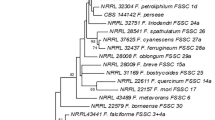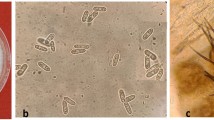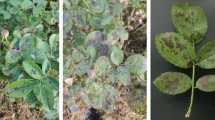Abstract
THE Ascomycete fungus, Epichloe typhina, has been recorded on eight species of Graminea in the neighbourhood of Aberystwyth during the past seven years. Although not a parasite of general economic importance in the district, the fungus has been decidedly destructive at the Station, entailing the loss of some valuable breeding plants. An investigation relative to the biology of the fungus started in 1922 has given some interesting results.
This is a preview of subscription content, access via your institution
Access options
Subscribe to this journal
Receive 51 print issues and online access
$199.00 per year
only $3.90 per issue
Buy this article
- Purchase on Springer Link
- Instant access to full article PDF
Prices may be subject to local taxes which are calculated during checkout
Similar content being viewed by others
References
References to the original papers on these topics may be found in the recent book by Dr. M. C. Rayner, entitled Mycorrhiza, an Account of Non-pathogenic Infection by Fungi in Vascular Plants and Bryophytes, New Phytologist Reprint, No. 15, 1927. The references are too numerous to print here.
Author information
Authors and Affiliations
Rights and permissions
About this article
Cite this article
SAMPSON, K. Disease of Grasses caused by Epichloe typhina. Nature 121, 92–93 (1928). https://doi.org/10.1038/121092b0
Issue Date:
DOI: https://doi.org/10.1038/121092b0
Comments
By submitting a comment you agree to abide by our Terms and Community Guidelines. If you find something abusive or that does not comply with our terms or guidelines please flag it as inappropriate.



